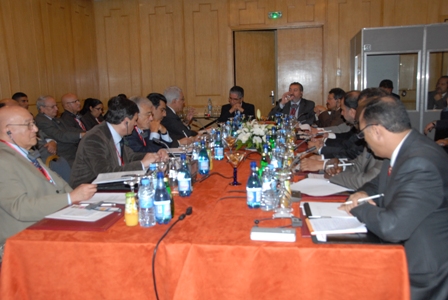CCDH STARTS AN ARAB IBERO-AMERICAN DIALOGUE TO STRENGTHEN COOPERATION BETWEEN NATIONAL HUMAN RIGHTS INSTITUTIONS
The advisory Council on Human Rights (CCDH) organized the first meeting of Arab Ibero-American national human rights institutions (NHRIs), on 12-13 October, 2010, in Casablanca.Representatives of Arab Ibero-American NHRIs from Algeria, Egypt, Mauritania, Palestine, Qatar, Sultanate of Aman, Portugal, Spain, Argentina, Equator, Mexico, Nicaragua, Venezuela and Salvador participated in this meeting, chaired by Mr. Ahmed Herzenni, CCDH President.

This meeting aimed to shed light on each institution and start a dialogue to strengthen cooperation between these institutions and exchange views, knowledge, and best practices on human rights issues. This dialogue will be positively reflected on the three regions. Despite their different contexts, Arab Ibero-American NHRIs face common and similar challenges: modernization, development, poverty, social inequality, etc.
Mr. Ahmed Herzenni, first welcomed the participants and stressed the importance of this meeting, which inaugurates a long path of cooperation to strengthen NHRIs’ role. Underlining political, cultural and social context similarities between these institutions, this meeting is considered as a promising step to start a lasting cooperation dialogue, he indicated.
On his turn, ICC member Mr. Fernando Gutiérrez Vera (Ecuador's public defender) stressed the importance of this meeting and dialogue between all countries, in general. He said that it is important to unite efforts to protect human rights and face the multiple challenges to protect civil, political and cultural rights in the world. He highlighted the importance of promoting human rights in the world and uniting Arab Ibero-American efforts in the economic, political and human rights fields in order to face common challenges.
NHRI representatives gave general presentations on their institutions, which double their efforts to play an active role as independent stakeholders and effective human rights defenders. These institutions work to promote human rights, receive complaints, harmonize national law with international standards, encourage governments to ratify international human rights conventions, etc.
The participants discussed three main subjects: transitional justice, economic, social and political rights and terrorism. All participants agreed that terrorism, which was added to the agenda of the meeting, is a serious violation of the main human right: the right to life. They all stressed the necessity to fight it in accordance with the law.
The participants of this meeting made suggestions on the field of cooperation and anticipated the results of the meeting. They underlined the importance of translating the recommendations of this meeting into facts. They agreed on the creation of a follow-up committee composed of two members from each region: Morocco and Qatar (Arab region), Portugal and Spain (Iberian region) and Equator and Mexico (Latin America), and Nicaragua and Palestine as observers.
The participants indicated that diversity of NHRIs is a motivation for cooperation to promote and protect human rights. They stated that priority should be given to several main rights: right to life, right to food, right to water, etc. and stressed the importance of promoting human rights culture and protecting the right to live in a sound and healthy environment.






















